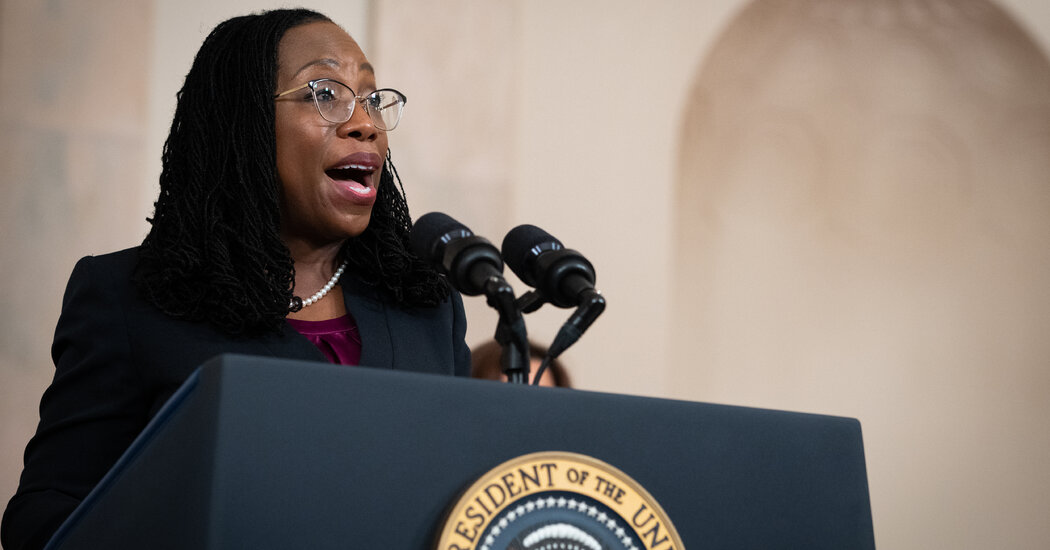
WASHINGTON — After the Supreme Court’s landmark 2004 ruling that Guantánamo Bay prisoners could file lawsuits challenging their indefinite detention, the federal public defender in the District of Columbia took on several such cases and assigned a young lawyer in his office to handle them: Ketanji Brown Jackson.
“They involved very complex legal issues that were just being worked out and it needed someone who was incredibly bright and an incredibly good lawyer,” recalled the public defender, A.J. Kramer. “We thought Ketanji was the best fit.”
Ms. Jackson, who went on to become a federal trial judge and then an appeals court judge, is now President Biden’s Supreme Court nominee. But her two and a half years as an assistant public defender, including her work on behalf of accused terrorists and of criminal defendants, is likely to receive particular scrutiny under the glare of her coming confirmation fight.
Lawyers who harbor ambitions to be a judge — as she clearly did, having written in her high school yearbook that a judgeship was her goal — typically serve as prosecutors who help put criminals in prison. If confirmed, Judge Jackson would be the modern court’s first justice with experience as a public defender.
She has also had to navigate the politics of having represented unpopular clients. At her confirmation to be a district court judge in 2012, for example, Senator Charles E. Grassley, Republican of Iowa, challenged her about her Guantánamo work, saying her record raised “some concern about how you will handle terrorism cases that may come before you.”
Ms. Jackson assured Mr. Grassley that she believed that terrorists posed a danger to the United States and that the country was at war with them, while distancing herself from the Guantánamo cases she had worked on.
“In all of those situations, the views that were expressed were the views of my clients that I represented,” she told him, adding, “The briefs did not necessarily represent my personal views with regard to the war on terror or anything else.”
Judge Jackson has deep roots in thinking about criminal law from multiple perspectives. One of her uncles was sentenced to life in prison on cocaine charges. But another was Miami’s chief of police, a third uncle was a sex crimes detective, and her brother worked as a police officer in Baltimore — before he took a job as an investigator in the same federal public defender’s office where she had mostly handled appeals, Mr. Kramer said.
As an undergraduate at Harvard, she wrote a senior thesis in 1992 titled “The Hand of Oppression: Plea Bargaining Processes and the Coercion of Criminal Defendants.”
After graduating from Harvard Law School, clerking for several judges — including Justice Stephen G. Breyer, the man she would succeed — and practicing corporate law, Ms. Jackson spent several years as a lawyer for the United States Sentencing Commission.
There, she later wrote, she came to realize that she “lacked a practical understanding of the actual workings of the federal criminal justice system, and I decided that serving ‘in the trenches,’ so to speak, would be helpful.” She thought the public defender’s office would provide that knowledge while also being “an opportunity to help people in need, and to promote core constitutional values.”
Mr. Kramer, who interviewed her for that job, recalled that her previous role at the Sentencing Commission had focused on a “data-driven and numbers-crunching” approach to the criminal justice system.
“She clearly wanted to see how the system worked in actuality, and was more interested in the defense side of trying to help people who came from very unfortunate backgrounds,” he said. “And it also gave her a chance, I think, to work with human beings involved in the system.”
Judge Jackson served as an assistant public defender from February 2005 until June 2007, before returning to corporate law. In a Senate questionnaire for her first judicial nomination, in 2012, Judge Jackson said that as a public defender, she had argued before the appeals courts about 10 times.
One of her cases involved a man named Andrew J. Littlejohn III, who had been convicted of unlawfully possessing a firearm as a felon after the police found a gun hidden in a laundry basket while searching the house where he lived with his mother. Ms. Jackson appealed his conviction on several grounds, including because the trial judge had asked potential jurors questions in a way that could have masked whether some had relatives who were police officers and might be biased.
In a unanimous ruling, a three-judge panel agreed that the juror questioning had been flawed and vacated Mr. Littlejohn’s conviction.
“Under the particular circumstances of this case, the district court’s use of compound questions violated Littlejohn’s Sixth Amendment right to an impartial jury,” Judge David S. Tatel wrote.
During her 2021 confirmation to the U.S. Court of Appeals for the District of Columbia, Senator Ben Sasse, Republican of Nebraska, asked Judge Jackson in writing whether she ever worried that her time as a public defender “would result in more violent criminals — including gun criminals — being put back on the streets?”
She replied that for the justice system to work properly, those accused of crimes must be represented by “competent legal counsel to hold the government accountable for providing a fair process and otherwise assist in the preparation of a defense against the charges.” Lawyers in the federal public defender’s office, she continued, “perform this crucial function.”
She also won an appeals court ruling overturning the conviction of a former lawyer who had been convicted of tax evasion related to taking a Mercedes-Benz 500SL the mother of a drug-dealing client had given him as a retainer. The case turned on a complex dispute over the production of papers that the court ruled violated his Fifth Amendment right against self-incrimination.
And she won a ruling obtaining a new sentencing for a man who had pleaded guilty to possessing tools for making fraudulent identification documents because the trial judge had failed to follow a federal rule regarding a disputed factual matter that affected the length of the prison term.
Mr. Kramer recalled her as a friendly colleague who was considerate and never complained about the heavy workload. He said that they often discussed raising their children. Ms. Jackson loved the reality television show “Survivor,” he added, and “would talk about the strategy of the various contestants.”
It was in that job that Mr. Kramer assigned Ms. Jackson to help with the habeas corpus litigation for several Guantánamo detainees. And later, at a corporate law firm, Ms. Jackson also filed friend-of-the-court briefs on behalf of two groups supporting challenges to Bush-era detention policies, including a claim that the government could detain a lawful permanent resident arrested on domestic soil without charges and as an enemy combatant.
During her 2021 confirmation hearing, Senator Tom Cotton, Republican of Arkansas, challenged her about some of that work. Judge Jackson parried, telling him that she had been assigned those cases and noting that her brother had been deployed to Iraq with the military.
But in a written follow-up response, she opened up more, portraying herself as one of “many lawyers who were keenly aware of the threat that the 9/11 attacks had posed to foundational constitutional principles, in addition to the clear danger to the people of the United States.”




